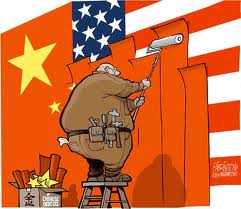In recent weeks we’ve seen a flurry of articles about China’s slowdown and whether the country has the ability to keep social order intact as things slow down. I am not an economist, but I’ve followed these stories with great interest. I have many friends working in China, and the last thing I want to see is a US-style financial meltdown that could wipe out opportunities for millions of Chinese.
That China is slowing down dramatically is a matter of fact, not debate. Even those who are the most optimistic about China’s future say there is no denying that in the foreseeable future we won’t see the 9 percent growth rates we’ve so gotten used to. The difference of opinion deals with how China deals with the slowdown and whether it can avoid a hard landing. Another thing I believe all parties agree with is that no matter how things end up, China will remain an economic engine of huge global influence. China won’t go away, and its importance as an economic superpower will remain largely intact.
I want to look at a link from several weeks ago that caught my eye, a piece in Forbes by the founder and CEO of the highly respected Straford think tank. If you look through their archives you’ll see they have no bias against China. The article is decidedly pessimistic about China’s economic prospects in the near future, the country being caught between the rock and the hard place of needing to keep the economy growing and needing to rein in uncontrolled borrowing.
Beijing was terrified of unemployment and the social consequences that flow from it. This was a rational fear, but one that contradicted China’s main strength, its wage advantage. Because the Chinese feared unemployment, Chinese policy, manifested in bank lending policies, stressed preventing unemployment by keeping businesses going even when they were inefficient. China also used bank lending to build massive infrastructure and commercial and residential property. Over time, this policy created huge inefficiencies in the Chinese economy. Without recessions, inefficiencies develop. Growing the economy is possible, but not growing profitability. Eventually, the economy will be dragged down by its inefficiency.
As businesses become inefficient, production costs rise. And that leads to inflation. As money is lent to keep inefficient businesses going, inflation increases even more markedly. The increase in inefficiency is compounded by the growth of the money supply prompted by aggressive lending to keep the economy going. As this persisted over many years, the inefficiencies built into the Chinese economy have become staggering.
The second thing to bear in mind is the overwhelming poverty of China, where 900 million people have an annual per capita income around the same level as Guatemala, Georgia, Indonesia or Mongolia ($3,000-$3,500 a year), while around 500 million of those have an annual per capita income around the same level as India, Nicaragua, Ghana, Uzbekistan or Nigeria ($1,500-$1,700)… Stimulating an economy where more than a billion people live in deep poverty is impossible. Economic stimulus makes sense when products can be sold to the public. But the vast majority of Chinese cannot afford the products produced in China, and therefore, stimulus will not increase consumption of those products. As important, stimulating demand so that inefficient factories can sell products is not only inflationary, it is suicidal. The task is to increase consumption, not to subsidize inefficiency.
We’ve all heard about the necessary shift in China from relying on exports to adopting a more domestic consumption-based model. But that’s not realistic. Chinese people still save more than they consume, and the market to buy all the goods China produces simply isn’t there. I highly recommend reading this entire fascinating article. It’s scary as hell.
China has recently tried to cool off its real estate buying and selling frenzy and has tried to rein in the banks, something they have been schizophrenic about, as the more they try to cool things off the greater the possibilities of greater unrest. That’s why they’ve tolerated over-production and endless construction. Some Chinese argue that all that new housing in urban areas is necessary to fulfill the government’s strategy of moving millions of Chinese from the countryside to cities to improve their lives. but so much of what is being built is middle-class and even luxury housing. Can migrant workers possibly be expected to afford living there? (No.)
There is no easy way out. The best China can do is try to forestall the inevitable for as long as they can, and try to take measures now that will soften the impact.
They continue to have a command economy; they are still communist, after all. But they cannot avoid the consequences of their economic reality, and the longer they put off the day of reckoning, the harder it will become to recover from it. They have already postponed the reckoning far longer than they should have. They would postpone it further if they could by continuing to support failing businesses with loans. They can do that for a very long time — provided they are prepared to emulate the Soviet model’s demise. The Chinese don’t want that, but what they do want is a miraculous resolution to their problem. There are no solutions that don’t involve agony, so they put off the day of reckoning and slowly decline.
Around the same time, Paul Krugman, whose economic predictions tends to always be right, wrote that China has hit a wall. An economic crisis isn’t coming, it’s already here.
Wages are rising; finally, ordinary Chinese are starting to share in the fruits of growth. But it also means that the Chinese economy is suddenly faced with the need for drastic “rebalancing” — the jargon phrase of the moment. Investment is now running into sharply diminishing returns and is going to drop drastically no matter what the government does; consumer spending must rise dramatically to take its place. The question is whether this can happen fast enough to avoid a nasty slump.
And the answer, increasingly, seems to be no. The need for rebalancing has been obvious for years, but China just kept putting off the necessary changes, instead boosting the economy by keeping the currency undervalued and flooding it with cheap credit. (Since someone is going to raise this issue: no, this bears very little resemblance to the Federal Reserve’s policies here.) These measures postponed the day of reckoning, but also ensured that this day would be even harder when it finally came. And now it has arrived.
China’s slowdown, he argues, would create or at least greatly contribute to a global slump. He concludes, “No doubt many readers are feeling some intellectual whiplash. Just the other day we were afraid of the Chinese. Now we’re afraid for them.”
My view is that the “day of reckoning” will have to arrive, but this being China it might still be years away. The problem is the longer they put it off the more painful the crash will be. All economies have to go through recessions, and China’s can’t put that off forever. There has to be a time when it reaches a breaking point, where factories can’t keep producing goods no one is buying and developers can’t keep building ghost housing. Yet China never ceases to amaze me with its ability to plod forward and put off the catastrophe many economists have predicted for years, even for decades.
One last article to look at. Michael Pettis, a very well-regarded professor of economics at Beijing Daxue, argues that the slowdown China is now going through doesn’t need to be as awful as some predict, even if it goes down to 4 percent growth a year.
An orderly rebalancing, in which China’s savings rate declines steadily relative to investment, implies a contracting trade surplus that will add net demand to the world. A disorderly rebalancing might imply an explosion in the trade surplus that would weaken an already struggling global economy. Whether slowing Chinese growth is good or bad overall for the world, in other words, depends on how it affects China’s balance of trade, and this depends on how swiftly and forcefully Beijing is able to constrain credit growth and rebalance the economy.
How a Chinese slowdown affects the global economy, in other words, depends crucially on how China rebalances. The seeming determination of Premier Li Keqiang to come to grips with debt and force a rebalancing even if that brings, as it must, a sharp slowdown in economic growth bodes well for an orderly rebalancing which will benefit most of the world.
What about the social impact of slower Chinese growth – can ordinary Chinese tolerate growth rates much below 7 percent? The same process that determines the impact of slower Chinese growth on the rest of the world will also determine how it will affect ordinary Chinese.
Pettis compares China’s slowdown to what we’ve seen in Japan, and argues that maybe, like Japan, the Chinese won’t care so much about the declining GDP as long as their own family’s disposable income is enough to meet their needs. Again, I’m no economist, but it seems to me Japan had a crucially different situation because so much of its population was already very comfortable financially when the decline arrived. They had/have enough to keep on buying goods. In China, most citizens aren’t that lucky and may not be able to deal with the impact of a massive slowdown.
For every theory you may have about China’s economy you can find the data to support it. Ongoing prosperity or a financial catastrophe. I don’t pretend to know which, if any, of these scenarios plays out, but I do know that the current slowdown will have to have gut-wrenching effects at some point in the future. I hope China’s leaders can apply their “scientific” approach to economics and save China from a hard landing. But they have a daunting task, and no matter what they do, somebody’s going to be hurt, eventually.




Comments